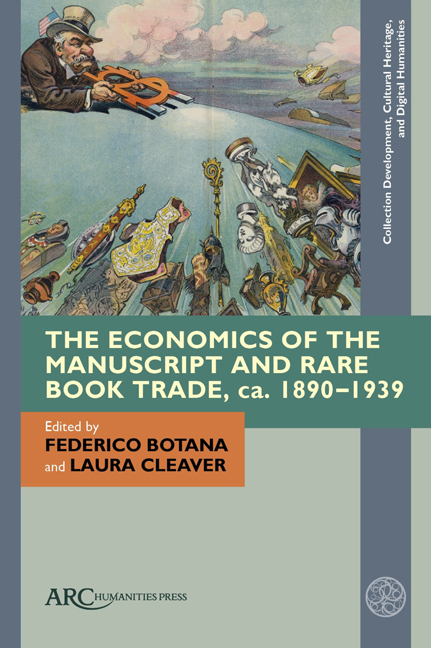Book contents
- Frontmatter
- Contents
- List of Illustrations
- List of Tables
- Acknowledgments
- Abbreviations
- Introduction. The Value of Rare Books
- Chapter 1 Valuing Rare Books in 1920s Germany: Prices in Jacques Rosenthal’s Bibliotheca medii aevi manuscripta
- Chapter 2 Leo S. Olschki’s Card Index and Potential Profits
- Chapter 3 Stock-books and Ledgers: J. & J. Leighton and Édouard Rahir and Company ca. 1897–1904 and E. P. Goldschmidt and Company ca. 1925–1933
- Chapter 4 Léopold Delisle, Henri Omont, and the Price of National Collecting: The Medieval Manuscript Acquisitions of the Bibliothèque nationale ca. 1900–1910
- Chapter 5 Herschel V. Jones: Public Collections and Private Investments
- Conclusion
- Appendix 1 Inflation
- Appendix 2 Exchange Rates
Chapter 4 - Léopold Delisle, Henri Omont, and the Price of National Collecting: The Medieval Manuscript Acquisitions of the Bibliothèque nationale ca. 1900–1910
Published online by Cambridge University Press: 28 March 2024
- Frontmatter
- Contents
- List of Illustrations
- List of Tables
- Acknowledgments
- Abbreviations
- Introduction. The Value of Rare Books
- Chapter 1 Valuing Rare Books in 1920s Germany: Prices in Jacques Rosenthal’s Bibliotheca medii aevi manuscripta
- Chapter 2 Leo S. Olschki’s Card Index and Potential Profits
- Chapter 3 Stock-books and Ledgers: J. & J. Leighton and Édouard Rahir and Company ca. 1897–1904 and E. P. Goldschmidt and Company ca. 1925–1933
- Chapter 4 Léopold Delisle, Henri Omont, and the Price of National Collecting: The Medieval Manuscript Acquisitions of the Bibliothèque nationale ca. 1900–1910
- Chapter 5 Herschel V. Jones: Public Collections and Private Investments
- Conclusion
- Appendix 1 Inflation
- Appendix 2 Exchange Rates
Summary
THE BIBLIOTHÈQUE NATIONALE was one of the most important national libraries active in the manuscript trade in the early twentieth century. In addition to receiving a steady flow of donations, its curators consistently sought out new medieval manuscripts to enrich the already world-leading collection. The librarians operated within a value system distinct from other consumers in the market, spending not their own resources, but those allocated by the state to buy objects of cultural and national significance important to the nation’s heritage and the institution’s global reputation. Between 1874 and 1905, the library was directed by the formidable Léopold Delisle, a world-renowned scholar and public figure, who had previously held the role of curator of manuscripts. His reign marked a particularly fruitful era for the library’s manuscript holdings and his forced retirement in March 1905 inevitably had an impact on future acquisitions. Following his promotion in 1874, Delisle maintained his involvement in the activities of the department of manuscripts and worked closely with its curators. Henri Omont was promoted to curator of manuscripts in December 1899 and held this position until his retirement in 1933. Whilst he shared Delisle’s commitment to the library’s manuscript holdings, Omont did not have his mentor’s political influence. He did, however, possess a keen interest in the trade and shrewdly employed the department’s budget to buy manuscripts at what he deemed the fairest price.
Delisle’s career coincided with an era in which the market for medieval manuscripts was both relatively abundant and affordable. By the dawn of the twentieth century, the emerging participation of affluent American buyers in the European market drove up prices, especially those of illuminated books. Delisle had managed to secure for the Bibliothèque nationale a number of “manuscrits à peintures” in the previous decades (despite already “excessive” prices), but by the end of the nineteenth century the library was largely excluded from competing for such volumes. The library did, however, manage to obtain more modest manuscripts in large numbers, focusing in particular on items made in the region of modern France, written in the French language, or of French provenance. Omont’s first decade as curator was the most prolific of the twentieth century, benefitting from the initial support of Delisle and the dispersals of large collections formed in the previous century.
- Type
- Chapter
- Information
- Publisher: Amsterdam University PressPrint publication year: 2024

